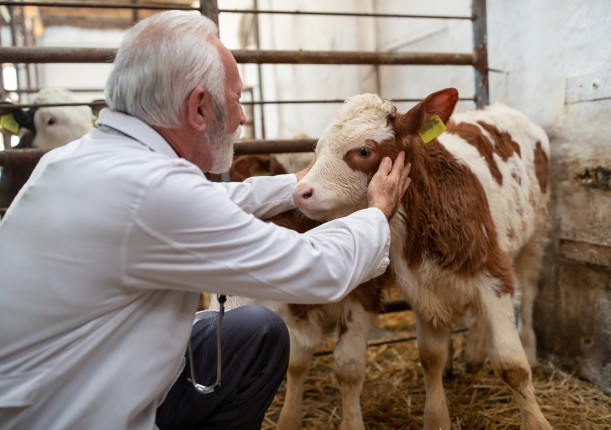Worried About Bird Flu Mutation, Feds Seek Livestock Worker Vaccinations

Veterinarian giving a cow a check up. (Shutterstock)
Federal health officials are encouraging farm workers who tend livestock and poultry to get vaccinated for seasonal influenza to help prevent a bird flu mutation that might spark a pandemic in people.
The U.S. Centers for Disease Control and Prevention said Tuesday that it would devote up to $5 million to pay for the vaccinations and that it will rely on states to implement the initiative.
There are 14 known human infections of highly pathogenic avian influenza that resulted from contact with infected dairy cattle and poultry in the United States, and all but one has happened in the past four months.
Wild birds have circulated the virus for more than two years, and it has sporadically transmitted to domestic birds. A variation of the virus has been infecting U.S. dairy cattle since December, and four people who worked closely with infected cattle also became ill.
In recent weeks, nine people in Colorado who were tasked with culling infected poultry contracted the virus.
The CDC has maintained that the virus’ risk to humans is low — those who have been infected so far had minor symptoms of respiratory illness or pinkeye, or both.
It has not been shown to transmit between people, but the virus has the potential to rapidly gain that ability if it infects someone who also has a seasonal flu virus.
“Such dual infections, while rare, could potentially result in an exchange of genetic material between two different influenza viruses,” Dr. Nirav Shah, principal deputy director for the CDC, said in a call with reporters Tuesday.
Shah said that “reassortment” process could pose a “significant public health concern” if bird flu gains the ability to spread person-to-person the way seasonal flu does, potentially resulting in a virus that spreads easily and causes severe symptoms.
A New Vaccination Campaign
Shah said the CDC will devote up to $10 million for farm workers’ health related to avian flu. Half will be spent educating and training farm workers about how to avoid being infected.
The other half will pay for seasonal flu vaccines for an estimated 200,000 farm workers who tend livestock and poultry. The CDC hopes to vaccinate all of them but acknowledges that less than half of the general population typically gets a flu shot.
How the voluntary vaccination effort will proceed is unclear. State health officials are expected to implement the effort, most immediately in the 13 states that have confirmed infections among cows.
That includes Iowa, where 13 dairy herds have been infected. However, no new infections have been reported in the state in the past month.
A spokesperson for the Iowa Department of Health and Human Services — which presumably would coordinate with the CDC — did not immediately respond to a request to comment for this article.
The vaccine will not protect the workers from contracting bird flu, Shah said, nor will it guarantee they won’t be infected by seasonal flu. But he said it’s an important component of the public health response to the new virus’ threat.
“The risk here is a theoretical but important risk,” Shah said.
Colorado Has Most Recent Infections
The confirmations of new bird flu infections among cattle have waned significantly in most states, except for in Colorado. In the past 30 days, two-thirds of the nation’s 32 newly infected herds were in that state, according to U.S. Department of Agriculture data.
Some of that might be due to Colorado’s robust testing protocols, but it’s also “a quirk of history and geography,” said Eric Deeble, deputy under secretary for marketing and regulatory programs for the USDA.
The state has far fewer dairy farms than the leading milk-producing states, but most of them are concentrated in one county.
“They are all in very close proximity to one another, and so there is a lot of sharing of equipment, a lot of sharing of personnel and a lot of movement on and off farms to adjacent farms,” Deeble said.
The USDA has identified the movement of equipment and people between dairy farms as a primary vector for virus transmissions from herd to herd and from herd to flock.
The virus has been identified in 172 dairy herds in the United States this year. Fifty of them are in Colorado. In Texas, where the infections originated, the virus was confirmed in 22 herds, although many went untested because they recovered before bird flu was identified as the culprit.
This story was published by Nebraska Examiner, an editorially independent newsroom providing a hard-hitting, daily flow of news. Read the original article: https://nebraskaexaminer.com/2024/07/31/worried-about-bird-flu-mutation-...
Category:
User login
Omaha Daily Record
The Daily Record
222 South 72nd Street, Suite 302
Omaha, Nebraska
68114
United States
Tele (402) 345-1303
Fax (402) 345-2351




